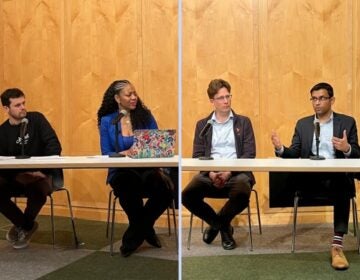Inside the Philadelphia Parking Authority’s feud with SideCar
In the world of tech innovation, “disruption” is all the rage. But disruption can also bring conflict. New technology and old rules often clash.
The latest example? SideCar, a new app-based ridesharing service that makes it easy to catch a ride in a stranger’s car.
Philadelphia is the first East Coast market for the San Francisco-based startup. But SideCar has been met with stiff resistance from Philadelphia city government.
How it works
SideCar starts with an app. You download it to your phone, create an account and enter your credit card information.
It knows where you are, and you tell it where you want to go. Local drivers — regular people driving private cars — are alerted to nearby requests and can pick you up if they choose.
Based on how much money similar rides have gone for in the past, SideCar suggests a “donation” that you pay the driver. The funds come out of your account and into the driver’s account, all electronically.
The company takes a 20 percent cut on each transaction.
At the end of each ride, the rider rates the driver, and the driver rates the rider. To SideCar, this builds the type of communal trust that can’t be achieved by the existing taxicab model.
Old vs. new?
Google is a major investor in SideCar. The start-up officially launched in June of 2012. Other than Philly, it currently operates in Los Angeles, San Francisco, Seattle and Austin. (The company is also in hot water with the Austin City Council.)
SideCar bills itself as a major innovation in urban transportation, but the Philadelphia Parking Authority doesn’t see it that way.
“We understand the convenience of it,” said Jim Ney, director of the PPA’s taxicab and limousine division. “However, you could be getting into a vehicle that has not been recently inspected, that is not insured, with a driver who was not properly vetted by a governmental entity.”
The PPA says SideCar amounts to an illegal taxi service.
After hearing from a “prominent industry member” that SideCar was operating in Philadelphia, Ney says the parking authority set up a sting operation.
On SideCar’s second weekend of service, a handful of unwitting drivers gave rides to undercover PPA officers, leading them to prearranged locations where cops and tow trucks were waiting. The drivers were each hit with at least $1,000 in fines. Three cars were impounded.
Ney’s message to SideCar is clear.
“They need to come into compliance with the taxicab and limousine regulations here.”
‘Friends’ with benefits
But SideCar isn’t speeding away.
CEO Sunil Paul says it’s all a big misunderstanding. He says SideCar isn’t an illegal taxi service; it’s a way to organize ridesharing and carpooling, which is exempt from PPA regulation.
“And if that’s not true, then they need to be pulling over everybody who carpools to work and splits the cost of the parking or splits the cost of gas,” said Paul. “What we are doing is not illegal. This is more like getting a ride from a friend than getting a ride in a taxi or a limo.”
Paul says those “friends” are vetted with criminal and driving history background checks. The company also takes a photo of each driver, matching it with up-to-date copies of a driver’s license, insurance card and registration.
This argument doesn’t hold much water with the PPA.
It insists that the only regulations that the public should trust are those that are sanctioned by the government and bound by law.
For its part, the PPA requires all taxi and limo drivers to pass government-authorized criminal and driving background checks.
It also forces potential city cab-drivers to take a five-day training course that’s designed to prepare them for both driving city streets and interacting with the public.
Follow the money
In SideCar’s mind, this crackdown isn’t actually a matter of safety. It’s a matter of a city protecting its own financial self-interest.
The PPA charges $115 to all cab-drivers for initial certification. It’s $75 a year after that.
All authorized Philly cabs must drive with an official medallion, which lately have been going for up to $450,000 on the open market. Each time one of the city’s 1,600 medallions gets transacted, the city takes a 3 percent fee. That’s roughly $13,500 a pop.
Now what?
The recent PPA sting has changed things.
Last Friday, SideCar and the PPA came to an understanding: SideCar could keep operating, as long as its drivers weren’t collecting money. After all, the PPA can’t regulate free rides. (SideCar met the same opposition, and came to the same solution in Austin, Texas.)
This arrangement is worthwhile to SideCar because they believe that city officials will eventually come around to their way of thinking.
As SideCar attempts to make that case, it views free rides as a way to maintain their brand presence in the city.
“This is a promotional phase,” said SideCar CEO Paul.
The company’s currently paying drivers $15 an hour to promote the service as “brand ambassadors.”
Taking a ride
So what’s the deal? Is this a shady taxi service or the next big thing out of Silicon Valley?
With that question in mind, we decided to find out.
Last Friday night, we got together in Kensington, and figured we’d test the service by catching a ride to Center City.
Within minutes of using the app to book a ride, an unmarked, newish, silver sedan arrived on our corner.
We explained our project and the driver agreed to talk, but she preferred that we didn’t use her name.
Over the course of the ride we learned she was born and raised in Philly, now living in Germantown. She applied to become a SideCar driver a couple of months back as a way to supplement the income she makes working for a cleaning service.
After passing the required background checks, she attended a one-day class where a SideCar representative taught her how the system worked.
Her first weekend as a driver was the weekend of the PPA sting. That night, she says the system was shut down before she had a chance to make any cash.
This past weekend, we were her first ride of the night.
As a “brand ambassador,” she was happy to be making a guaranteed flat rate. But after shelling out her own money for gas and other car-related expenses, she’s making less than she originally thought she would.
Still, she’s taking the long-view and embracing her current role.
“Sometimes you gotta crawl before you walk,” she said. “This is my donation to help a company grow here.”
Part of the reason she says she’ll remain loyal to SideCar during this shaky period is because the steady work offers her a unique opportunity to keep her life on the right track.
“I’m going on three months of no gambling,” she told us. “March the 11th, it’ll be three months. I’m about change. I used to smoke crack. I don’t do those things no more.”
After arriving at our destination safely, we mulled over the experience, and tried to come up with an overall assessment.
The verdict
One the one hand, the system worked well. We got from point “A” to point “B” without much of a hitch, and the service was very friendly.
On the other hand, one of the clear flaws was the driver’s familiarity with navigating the city. There were many points where she had to rely on the map on her phone to get around. She would drive with one hand, and let her eyes jump back and forth from the screen to the road.
We did take another ride a little later on in the night, from Center City to Northwest Philly. That driver was very professional and knew exactly where he was going without having to rely on a device.
Moving forward
When we followed up this week, Sidecar wouldn’t say exactly how much money the company lost making the service free, but CEO Sunil Paul did admit that this can’t go on forever.
In the meantime he’s been in contact with city officials, hoping he can convince them to adapt to the changing tides.
“This is a new phenomenon,” Paul said. “It is a new medium. And this new medium needs new rules.”
The PPA hasn’t indicated anything suggesting it is open to change. A spokesman for the mayor says the PPA is handling the issue.
While it waits, SideCar is still deciding whether to will bankroll free rides this weekend as well.
—
UPDATE: March 8, 5:50 p.m. — A SideCar representative confirmed that the company did terminate a driver’s employment for violation of their terms of service.
March 8, 11:30 a.m. — The driver featured in this story reached out to us via text message earlier this morning saying SideCar has let her go. “I lost my job,” she wrote.
WHYY is your source for fact-based, in-depth journalism and information. As a nonprofit organization, we rely on financial support from readers like you. Please give today.



